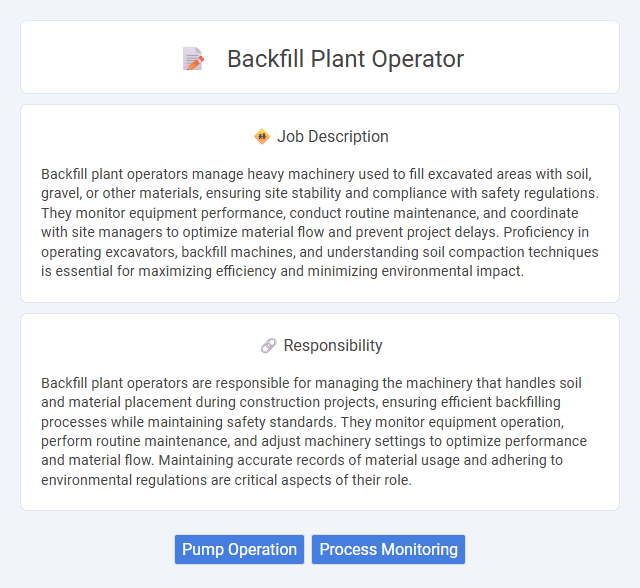
Backfill plant operators manage heavy machinery used to fill excavated areas with soil, gravel, or other materials, ensuring site stability and compliance with safety regulations. They monitor equipment performance, conduct routine maintenance, and coordinate with site managers to optimize material flow and prevent project delays. Proficiency in operating excavators, backfill machines, and understanding soil compaction techniques is essential for maximizing efficiency and minimizing environmental impact.
Individuals with strong physical endurance and good hand-eye coordination are likely suitable for the Backfill Plant Operator role, as the job involves operating heavy machinery and managing material placement efficiently. Those who can work in outdoor environments and handle repetitive tasks with attention to safety protocols may find this position appropriate. Candidates lacking stamina or prone to safety oversight might struggle to meet the demands of this role.
Qualification
Backfill plant operators require a high school diploma or equivalent, with specialized training in heavy machinery operation and safety protocols. Certification in operating backfill equipment, such as excavators and bulldozers, alongside knowledge of soil compaction techniques, is essential. Strong mechanical aptitude and experience with site preparation standards ensure efficient and safe backfill plant operations.
Responsibility
Backfill plant operators are responsible for managing the machinery that handles soil and material placement during construction projects, ensuring efficient backfilling processes while maintaining safety standards. They monitor equipment operation, perform routine maintenance, and adjust machinery settings to optimize performance and material flow. Maintaining accurate records of material usage and adhering to environmental regulations are critical aspects of their role.
Benefit
Backfill plant operator positions likely offer competitive salaries and opportunities for overtime pay, contributing to financial stability. Benefits may include health insurance, retirement plans, and paid time off, enhancing overall job security. Employers might also provide on-the-job training, promoting career advancement and skill development.
Challenge
The role of a backfill plant operator likely involves managing complex machinery and ensuring precise material handling, which may present significant operational challenges. Operators probably face the difficulty of maintaining consistent production rates while adhering to strict safety and environmental regulations. The probability of encountering mechanical issues or supply chain delays could further complicate daily responsibilities, requiring strong problem-solving skills and adaptability.
Career Advancement
Backfill plant operator roles offer significant career growth opportunities within the construction and mining industries due to increasing demand for skilled machinery operators. Professionals can advance by gaining certifications in heavy equipment operation, mastering safety protocols, and developing expertise in site management and logistics coordination. Progression often leads to supervisory positions, project management roles, or specialized technical training in material handling systems.
Key Terms
Pump Operation
Backfill plant operators specialize in pump operation to manage the efficient movement and placement of materials such as slurry, cement, or grout in construction and mining sites. Proficiency with centrifugal and positive displacement pumps ensures consistent pressure and flow rates, optimizing backfill application and minimizing downtime. Knowledge of pump maintenance, troubleshooting, and safety protocols is critical to maintaining plant reliability and meeting project specifications.
Process Monitoring
Backfill plant operators oversee the continuous monitoring of equipment and material flow to ensure efficient soil and aggregate placement during construction projects. They utilize instrumentation and control systems to track parameters such as moisture content, compaction levels, and conveyor speeds, optimizing backfill quality and minimizing downtime. Precise process monitoring aids in maintaining safety standards and adhering to project specifications, directly impacting overall site productivity.
 kuljobs.com
kuljobs.com